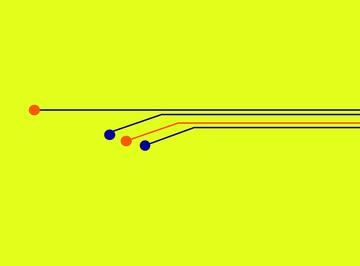'CHANNELS OF DIGITAL SCHOLARSHIP' SEMINAR
Similar events
'Generative AI: ChatGPT and its impact on research in higher education'

Register in advance for this webinar:
https://univ-amu-fr.zoom.us/meeting/register/tZ0qc--qpj4oHdI5jcx5ERwMIFIEAe74CZLD
Speakers:
Niccolò Monti (Université Paris 8, Università di Torino) “Is there a machine in this class? The ideology of (linguistic) automation”
Mélanie Jouitteau (CNRS, IKER), "Wikigrammars, resource building for low-resource languages: an example from ARBRES, wikigrammar of Breton"
Convenor: Grégoire Lacaze (Aix-Marseille Université, MFO)
Niccolò Monti (Université Paris 8, Università di Torino) “Is there a machine in this class? The ideology of (linguistic) automation”
Long before large language models, when the advancements in natural language processing had barely brought about the earliest text generators, such as ELIZA in 1964, Lewis Mumford was among the first scholars to decry how far the education system had abided by the ideology of automation. Mumford argued that a new technical paradigm, owing to the spread of industrial ideals to fields other than manufacture, was affecting the humanities, just as much as the production of scientific demonstrations and truths in disciplines ranging from biology to physics. He advised against the automation of knowledge, and notably of its consequences on education, research, and, more strictly, our concept of creativity. Mumford’s view, however foundational, must be integrated when turning to today’s context and to the effects that are specific to LLMs.
The lecture probes these effects by situating the discussion in the literary field and focusing on three separate settings, so as to illustrate how knowledge—and creativity—automation is carried forth by generative AI. The settings are articulated through a question each:
1) What impact on education can we expect once ChatGPT enters the classroom? The chief preoccupation is whether the NLP technologies driven by progress in machine learning might eventually integrate the teacher’s work in preparing or presenting a lesson, or transform such things as the way that we conceive of knowledge–verification by means of written assessments.
2) What methodological changes will follow the introduction of these tools in the research room? The application of quantitative methods to literary studies has already boosted the current world of digital humanities. ChatGPT and the like might prove a fruitful addition to the researcher’s toolkit, with implementations in proofreading, drafting, summarizing, editing, translating (including text–to–image ekphrasis), in sentiment or textual analysis, and so on. But, as much as with the previous question, some limitations must be highlighted. The discussion deals with the ethical and semiotic implications of general–purpose language processing machines, whose training datasets may also consist of copyrighted material, imprecise documents, stereotyped knowledge, or clichéd linguistic uses.
3) Ultimately, what opportunities and downsides do these machines carry when welcomed in the writer’s room? This final section explores how creative writing is transformed by ChatGPT—and in general by machine learning. Many writers have employed NLP to experiment with their writing techniques. But, if the main concern for the developers of such tools is often to generate credible language, the issue becomes whether NLP–aided writing has the potential to, on one end, alter our aesthetic judgment and values, such as the perception of beauty or uncanniness, or, on the other end, to alter in a dramatic way the preparation of a literary text.
References
Berry, David M., Fazi, Beatrice, Roberts, Ben, and Webb, Alban (2019), “No Signal without Symbol: Decoding the Digital Humanities”, in Gold, Matthew K, Klein, Lauren F. (eds.), Debates in the Digital Humanities 2019, University of Minnesota Press, Minneapolis, 61–74.
Franceschelli, Giorgio, Musolesi, Mirco (2023), “On the creativity of large language models” [preprint article]. https://doi.org/10.48550/arXiv.2304.00008.
Gee, Erin, Audry, Sofian (2019), “Automation as Echo”, ASAP/Journal, vol. 4, n. 2, 307–312.
Hayles, Katherine N. (2002), Writing Machines, MIT Press, Cambridge (MA).
Henrickson, Leah (2018), “Computer-Generated Fiction in a Literary Lineage”, Logos, 29, 2–3, 54–63.
Henrickson, Leah (2021), Reading Computer-Generated Texts, Cambridge University Press, Cambridge.
Jacobson, Howard Boone, Roucek, Joseph S. (eds.) (1959), Automation and Society, Philosophical Library, New York.
Mélanie Jouitteau (CNRS, IKER) Wikigrammars, resource building for low-resource languages: an example from ARBRES, wikigrammar of Breton
This presentation proposes a guided tour of a linguistic resource for a highly endangered Celtic low-resource language, Breton. The wikigrammar ARBRES of the Breton dialects is a resource that shows useful to different academic and non-academic profiles: the speaking community and language experts, philologists and theoretical linguists, and finally language technology developers. I show how this resource incrementally builds ready-to-use material for these multiple actors. I propose a return on experience from 15 years of development, and I discuss the feasibility of such wikigrammars by academics. I show how large language models just made them easier to build.
https://arbres.iker.cnrs.fr/index.php?title=How_to_use_this_website



